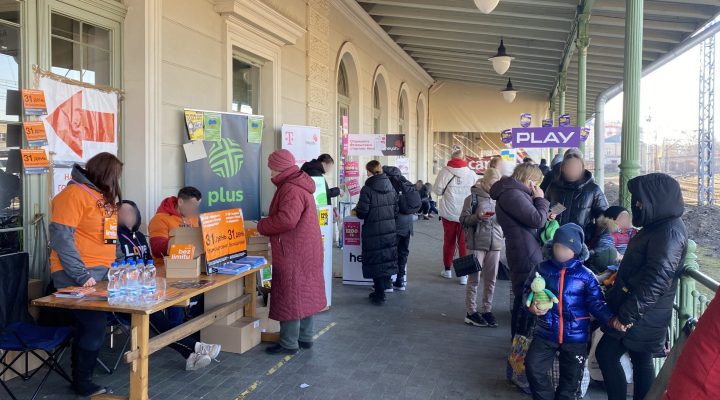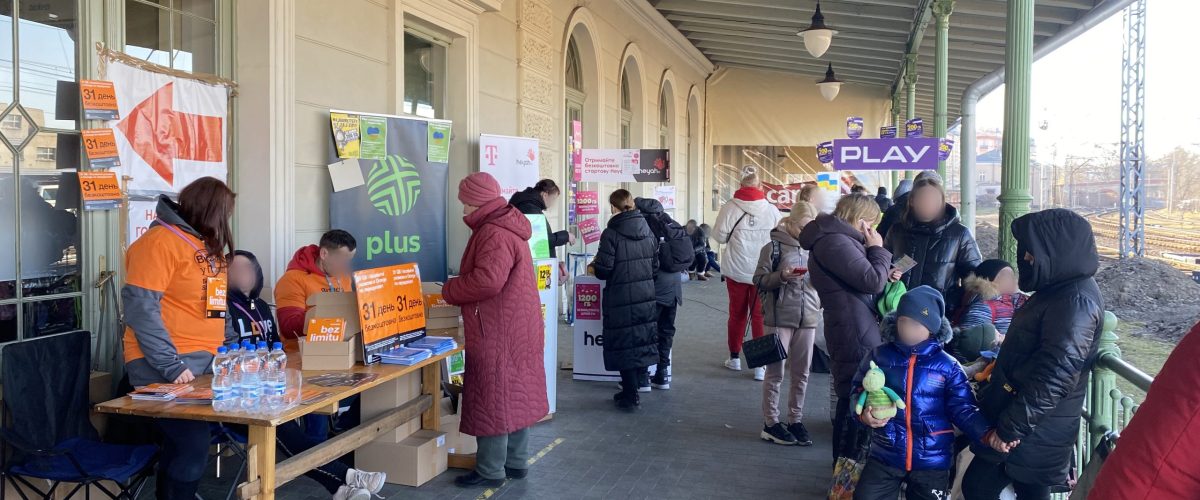Few people were flying into Warsaw in the first half of March. Those who were displayed a similar intensity — an unpolished, gut-level sense of mission.
Russia had invaded Ukraine on Thursday, Feb. 24.
A half dozen former U.S. servicemen sat circled near the boarding lane. I caught the eye of someone and joined their circle, my light blue sneakers standing out in a ring of combat boots and dark pants.
A blonde-haired woman walked up to the desk and asked the attendant to confirm that her nine checked bags had made it on the flight. She wouldn’t reveal the contents but did hint that she was delivering weapons to those in the fight.
As I sat with the guys, I mostly kept my mouth shut and observed.
When I finally shared that I was from North Texas and traveling on behalf of Unbound Now, a nonprofit that serves survivors of human trafficking, one of the men piped up, saying he was a lieutenant with the Fort Worth Police Department.
I was glad to meet someone who also was from Cowtown. Originally from Poland, the lieutenant was heading in-country to lend his language skills and knowledge of the area to help transport evacuees, including by crossing the border into Ukraine.
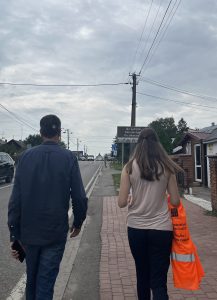
Allison Byrd shows a reporter through the streets on the Ukraine side of the Polish border in July 2022.
We boarded the flight, and I was seated next to a tough-looking guy wearing a face mask from the Beijing Olympics. Turns out, he was returning from China where he was in charge of setting the snowboarding courses for the Olympians.
He explained the Polish landscape to me. World War II destroyed Warsaw, but the more rural areas of the country, even the prominent city Krakow were spared. Warsaw has been entirely rebuilt, while Krakow’s streets and structures bear the marks of thousands of years of history, going all the way back to the Mongol conquest of the 11th century.
He reminded me that the effects of the more recent 20th century Soviet occupation remain in the architecture, business models and minds of the people.
When we landed, I shared some of our anti-trafficking cards with the guys and swapped contact information, then we hopped in an Uber to Warsaw Central train station. My first time in Poland.
I’ll always remember pulling out of the airport and passing an expansive memorial of tombstones on my right, honoring lives lost in World War II. The horrors of Auschwitz-Birkenau, the largest Nazi concentration camp, took place just 320 kilometers from this spot.
There was not a moment for jetlag.
Our hearts, minds and bodies were gripped. Cold, dry air greeted us as we stepped out of the cab. As we approached the train station, we walked past a small, wedding-style white tent.
Later we would find out that was an outpost of World Central Kitchen, a not-for-profit non-governmental organization devoted to providing meals in the wake of natural disasters — or wars. The organization fed thousands of refugees and volunteers daily from each one of its kitchens.
Warsaw Central Station: March 15, 2022
The train station was filled with women and children wearing winter coats, waiting for the next train they could fit on. Tailgate-style tents housed emergency medical services and government guides.
We had booked tickets online that would take us to Krakow, a city of 760,000 people that we had heard was receiving many refugees.
While waiting for our departure, I walked upstairs to a large indoor balcony. Women sleeping on mattresses lined the edges, and children sat looking mostly bored. No children misbehaved. The atmosphere was somber.
My colleague Bree Curley and I split up and began to talk with people.
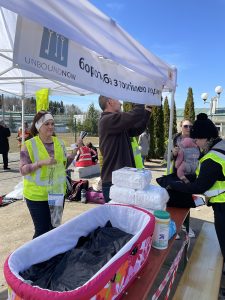
A Unbound Now tent and table set up on the Ukraine side of the border to give women a safe space to clean up their young children.
I had pink cards that read “Stay Safe” on the front. The flip side explained in soft language how to avoid trafficking situations.
When I said hello and showed one woman a card, tears filled her eyes, and she leaned in for an emotion-filled hug. Through Google Translate, she shared that she and her kids fled the war, leaving her husband and home behind. Another woman with kids walked up. She was a Polish woman who had been hosting this Ukrainian family for several days. The two women, new friends, were preparing to say goodbye as the Ukrainian mother took the next leg in her journey out of war.
I found Bree, and she recounted to me how one woman summed up her desires and those of her fellow Ukrainians leaving their war-torn country.
“I just wanted to see clear, blue skies that were not full of airplanes and bombs,” she said.
With these stories in our minds, we boarded a southbound train.
After three hours, we walked out onto to the platform at Krakow Glowny Train Station. It was incredibly crowded. Plastic folding tables of pet food and humanitarian supplies lined the hallways. Just as the newspapers in America had reported, many people fled with their beloved pets.
Red-haired van driver
After dropping our bags at the hotel, we walked one mile through the cold to a restaurant to meet some folks who had reached out to us via email. This would be the first of many times we would introduce ourselves to people we did not know in a place we did not know, something Ukrainian refugees continue to do daily. It was clear that some of these people deserved a hero’s designation.
“This would be the first of many times we would introduce ourselves to people we did not know in a place we did not know, something Ukrainian refugees continue to do daily.”
One 24-year-old named Sierra was a photographer from California whose parents were from Ukraine. She felt compelled to come and serve, devoting her language skills to helping people reach safety.
She had been driving a 15-passenger van from the Polish border town of Przemyśl to Lviv, the town about two hours from the Ukraine border crossing. She was exhausted, and her face seemed filled with pain. Seeing this caused me to wonder what we would see when we went to the border. I will never forget her bravery.
March 16, 2022
The following day, we met with several nonprofit leaders, caught up on emails and arranged to get the rest of the way to the border. When we picked up our rental car, no one asked if we had an international driver’s license. Law enforcement had bigger concerns.
A call we received that night marked the entire future of our crisis response team and mission.
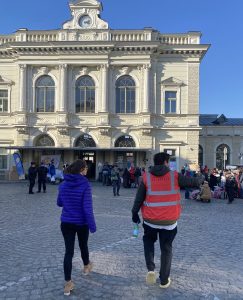
Walking up to the Przemyśl Train Station in Poland, where Unbound volunteers intervened in the two suspected trafficking situations.
“Hey. Are you the global human trafficking people?” an Australian voice asked. Confused, I said we might be and offered to help however we could.
I had received so many emails and messages in the previous three days that every new contact blurred together. Through a combination of flurried WhatsApp messages, it sounded like this man was leading a team of volunteers at the border, had witnessed some likely trafficking scenarios and wanted to talk about how to respond.
Bree and I met him in a hotel lobby to discuss.
One would think the anti-trafficking people would know better than to meet an unknown man in a hotel lobby at night, but there we were. He introduced himself, and we took a seat.
Several minutes later, another man and a former Miss Ukraine walked up and joined our circle. I could almost see the lives lost reflecting in her eyes.
The Australian man explained that the previous week, one of the refugees they connected with at the border texted one of their volunteers asking for help.
She was riding in a bus and was concerned that the bus wasn’t going toward the destination the driver had advertised. Sure enough, the bus arrived at an empty warehouse instead of the refugee center.
The volunteer who received the message called the police, who were able to intervene and get the refugees to a safe space.
The Australian man also said that “sketchy men” filled the train stations and border crossings. He said it wasn’t difficult to tell who a good-willed volunteer was and who was there to exploit.
“If you give me two days, I will show you what you need to see, and you can decide how to respond. We will help however we can,” he said.
After seeing so much grief, shock and dark despair in the previous 24 hours, I was struck by a sense of hope in this man’s eyes. I was intrigued, so the next morning we joined his caravan of rental cars down to the border.
Przemyśl Train Station, March 17, 2022
People in winter puff jackets teamed out of Przemyśl train station. The front of the station is a tall light-tan structure. Its architecture is distinct, not easily identifiable to any period. CNN and international news outlets reported live from out front, describing the confusion and chaos that awaited inside the building.
The train station hall is small, an appropriate size for its small town populous but a fraction of the capacity needed to facilitate the tens of thousands of people crossing the border daily. Tired people stood in lines to get the last remaining tickets on the day’s northbound trains. Children slept on the floors.
On the other side of the hall are four or five rail tracks. Volunteers in neon vests helped grandmothers carry their suitcases up the staircases between platforms. The Australian man led us through the cold windy corridors, distributing aid as we went. We quickly passed out anti-trafficking cards as we went, and they were well-received. People appeared to be eager for information.
One boarding platform stood 50 yards removed from the others.
A grey, concrete building with a tin roof housed a checkpoint. The people in line were returning to Ukraine, to cities like Mariupol and Odessa. Shocked, I prepared to walk the line like we had at other platforms, but I had no desire to hand out these cards. Trafficking awareness cards couldn’t protect any of these people from Russian missiles, destroyed train lines or land mines.
“Trafficking awareness cards couldn’t protect any of these people from Russian missiles, destroyed train lines or land mines.”
Neither could it remove the dread and sadness inside each person. Some were foreigners joining the ranks of the Ukrainian armed forces. Others were traveling home to collect family members.
One under-age girl traveling alone told me she had come to Poland but didn’t know what to do or how to find a place to sleep, so she was going home to Mariupol.
I felt sick to my stomach. How could an apparent 13-year-old return to likely death and destruction?
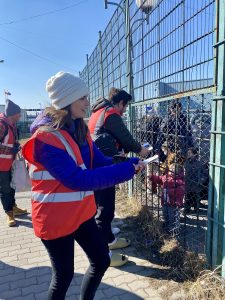
Allison Byrd passing safety information through the fence to women who were walking into Poland.
Then I saw the cards the Australian man had. They were different. Blue and yellow, the colors of the Ukrainian flag.
“What do those say?” I asked.
Quoting from the Jewish and Christian prophecies of Isaiah, it read: “Do not be afraid, for I am with you.”
Since Ukraine is a very religious country, these words resonated with people. He began to walk the line, putting cards into peoples’ gloved hands and embracing those who needed a hug. He prayed with several, offering a ministry of presence at what had to be one of the worst times in their lives.
A Ukrainian volunteer walked with me as we connected with one person at a time down this line for several minutes. As the sun went behind the clouds and a darkness began to set in, our guide started walking back to the main hall and we followed. Heart-in-hands, I followed.
Train station trafficking
We pulled our cold bodies into a restaurant at the train station to eat a 3 p.m. lunch of French fries and ketchup.
Inside, a European man wearing all black sat drinking several beers. He sat very close to a table occupied by a woman with two little girls, with whom he appeared to be flirting.
In the anti-human trafficking world, this behavior is called grooming — engaging in small touch or talk with a potential victim to build a false sense of trust before moving into more exploitative behavior.
When the young mother stepped outside, he played with the little girls. One could tell by looking that he was not a good man. A gentleman volunteering with the Red Cross (who appeared to have a hunting knife on his belt) nodded at us, indicating that something didn’t look right with the situation.
The man in black got up to relieve himself, and while he was gone, the Red Cross volunteer who spoke Ukrainian alerted the mother of the situation, herself tired and confused. With their permission, he quickly escorted them out from the restaurant and gave them a flyer on how to stay safe from potential kidnappers or traffickers in the future.
Meanwhile, the Australian man went to inform the Polish police. The officers dutifully came to respond. As they did, the man in black was angrily stumbling out of the restaurant and down the street away from the train station. We never saw him again.
As we prepared to leave the train station parking lot, one of the men on this volunteer team who spoke Ukrainian overheard a refugee woman on her cell phone telling a friend about a man who had offered to drive the woman and her children, share his facilities and take them wherever they wanted to go in Poland.
Many benevolent Polish people were engaging in similar forms of generosity, so the report was not unusual. However, our bilingual friend felt something here was not right.
He introduced himself to the women and asked if he could speak to the man purporting to be a host. They thanked him for his concern and agreed. The man arrived and quickly put the suitcases of the women and children in the back of his car, then opened the backseat passenger doors and motioned for them to get in.
“When our friend asked him a few questions, he became nervous and agitated.”
When our friend asked him a few questions, he became nervous and agitated. He didn’t want to show his ID or answer questions. We asked if he was willing to take male passengers or only women and children, and he became very defensive.
He pulled the suitcases out of his car, told our friend, “I will see you again,” and drove off.
Emotion was high. As a young woman, I was imagining what it would be like to put my safety and well-being in the hands of a stranger who spoke a different language. One of the women told our friend, “When I was talking to him, I felt alarm bells going off in my head. I didn’t know what to do. Thank you for being here.”
We gave long hugs and connected them to a woman inside the train station who would try to help secure housing through a network of verified churches. They already had slept on the floor of the train station for two days.
I walked back to the car, stunned by what we were seeing. In just a few hours at the train station, we had seen women and children’s lives on the line. The Australian man was right. The threats of traffickers were more prevalent than anyone knew.
More reports of trafficking interventions
Upon arriving at the hotel, I planned to fall into bed and sleep. A phone call altered that plan, but for the better. One of the men from the Frankfurt flight, the Fort Worth police officer, called to tell me a story. We had kept in touch via Facebook messenger to make sure each other was safe, but this update was profoundly moving.
As he was driving a family to a home they had made arrangements to stay in, he noticed some things were not right.
The property host owned a farm to which he had invited the refugees. Upon arrival, the host spoke about the women and girls to the lieutenant as though they were property. The lieutenant described the scene as one out of a human trafficking document, jarring to hear someone describe people for purposes for which they were not designed.
The lieutenant did not feel comfortable leaving the women with this man. He suspected he might force them to work on his farm and sexually violate them. The lieutenant showed the women one of the pink Stay Safe cards and invited them to ride with him back to town. They eagerly agreed.
Forced labor in the agriculture sector is one of the most prominent forms of trafficking in Poland. With that in mind, it appears that these women escaped a likely case of labor trafficking.
March 18, 2022, crossing the Ukraine border
At noon, we rolled up in our rental car to a parking lot that resembled a junk yard lined with wire fencing and a few Porta-Potty units.
Across the way, military supply trucks queued from the highway to the automobile border crossing station.
Five days prior, on March 13, Russian missiles targeted an area just 15 miles from the border, a fact of which I hoped my parents were not aware.
We paid five Euros to park our car in the makeshift lot, bundled up, and walked toward the pedestrian border crossing.
“Just a few days ago, I was sitting in a torts class in law school in Fort Worth. Now I was preparing to walk into Ukraine.”
Just a few days ago, I was sitting in a torts class in law school in Fort Worth. Now I was preparing to walk into Ukraine.
Before we could get to the border check point, we walked through a row of tents of aid workers and supplies. This area was packed with people, hot food and every aid relief supply imaginable. Bananas, hot rice and sausages were being served for free to all.
Tables with Polish SIM cards enabled migrants to keep in communication with loved ones for low cost after crossing the international border.
Volunteers from Spain, East Asia, America and across Europe were devoting their hours to providing a friendly face and needed supplies to families during those critical first few minutes of walking into Poland.
Buses came periodically to this “tent city” to bring Ukrainians from the border to the nearby Przemyśl train station.
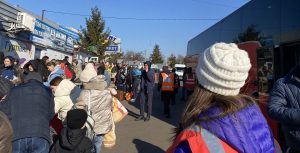
The line of refugees to enter Poland extends for hundreds of yards as buses and vans drop off more women.
The Australian man opened the door of the first cement check point station. We went through airport-style security and displayed our passports. One Western volunteer going through had a Russian visa from prior work travels. He hoped the border guard wouldn’t flip through his passport and see it. A Frenchman walking up behind us shared that he was coming to enlist as a foreign mercenary.
The guard stamped our passports, and we walked through the building out into the cold, then on to the next checkpoint. There again, we explained that we were aid workers. The guard permitted us to enter Ukraine.
I felt my breath being taken away as I saw a line of thousands of people. Those who had been approved were walking down hill into Poland.
The elevated border point offered a view into the new country, for those who could look up from their luggage and children to see it. Old grandmas struggled to drag their cases of treasured family items as they made it to this critical point in their international journey.
“Old grandmas struggled to drag their cases of treasured family items as they made it to this critical point in their international journey.”
Up the hill, the line inside Ukraine was packed and not moving so quickly. Families stood shivering in the cold.
A distressed woman approached me with a young toddler in her arms. Through sign language, I understood she was looking for a diaper, wipes and a place to clean up her baby.
I had nothing on me. There were no aid worker tents in Ukraine, only on the Polish side. She had an eight-hour wait ahead of her to reach those resources and a child whose diaper already was soiled. Filled with emotion and helplessness, I remember wanting to give her my shirt to wrap her baby in but being with a team of men I had only met last night and no privacy I wasn’t sure I could make that offer in decency.
Notably, COVID rules had ceased to exist. There were no masks, no evidence of the pandemic.
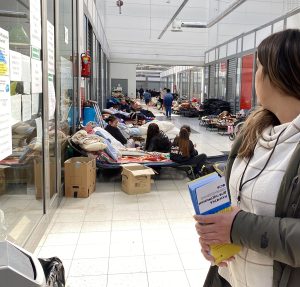
A volunteer distributing information about how to stay safe from trafficking with single travelers in the refugee center nearest to the border.
Most of these people had already taken 10- or 12-hour train rides across the Ukrainian farmland, followed by a bus ride from the nearby large city of Lviv to this border crossing.
Those with the resources to drive their own cars (war drove gas prices through the roof) could go through the automobile line. Everyone else traveled by foot with what they could carry in their hands.
Using Google Translate, I talked with many women. Some knew exactly where they were going: relatives in Germany, a Facebook friend in Krakow. Others had no idea; they simply took the next steps ahead of them.
Most had a glazed look in their eyes. Judging by what we all had read in the news, I could feel my breath tighten as I imagined the horrors they had witnessed.
The line of people continued. On our right, a small, canvas-wrapped tent stood in the wind with a sign in red spray-painted letters — “legion” — on the front. This was the foreign mercenary registration tent. Our French friend from the border crossing probably signed his papers and received an assignment here.
We continued walking until we reached the first main road in Ukraine. A sign read: “LVIV: 80 km, KYIV: 635 km.” I never imagined I’d be reading that road sign in my life.
Every few minutes, another bus would unload passengers who joined the growing line. For hundreds of thousands of people, this border crossing would be a juncture of the journey seared into their memories.
“As we walked onward, we heard music.”
As we walked onward, we heard music. A group of Ukrainians now serving as aid workers brought guitars and were singing songs with the children. They brought joy to many faces, and even adults sang along. The Australian man embraced many weary travelers with a welcome hug. He passed out chocolates, water and cards. Here again, people wept when they saw the hope-filled printed messages.
The Australian had been working long days and nights on the Ukraine side of the border, providing relief in areas where few others were willing to go. He was one of the first ones to help mothers and children off buses as they neared Poland. That meant he saw their uncovered faces.
No one made any attempt to hide the trauma.
People were visibly overcome with grief, pain and sorrow. How could one not be when imagining countrymen in Mariupol starving under siege, or having hidden in dark basements for several days before making the choice to leave?
But here at the border, I learned why he had hope in his eyes.
He found himself in the middle of an incredible network of Europeans making pathways to safety for other Ukrainians.
As wives parted ways with their husbands, other community members offered care and leadership for the ones traveling to Western Europe.
Many refugees soon would meet women like Evelina, a Slavic Instagram Influencer who had organized a housing network of churches across Europe and connected people to these safe options from her folding table in the Przemyśl train station.
They would meet people like Anton, a Ukrainian pastor who told his congregation: “We are not just refugees, we are missionaries to Europe.”
They would meet people like Alina and the lieutenant, providing safe travel on dangerous roads.
And they would meet Agata, a courageous Polish woman in a black leather jacket providing crisis response care for recently rescued Ukrainian victims of sex trafficking.
Over the following months, during two month-long trips with numerous excursions to the borders and refugee centers, I witnessed these stories of hope unfold.
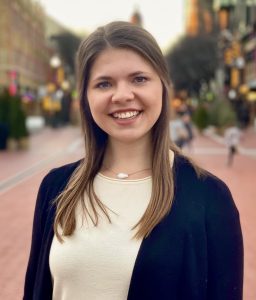
Allison Byrd
Allison Byrd, a Fort Worth native, is a law student at Texas A&M University. She graduated with a B.A. in international affairs from Georgetown University. Unbound Now is an international anti-trafficking nonprofit with a mission to support survivors and resource communities to fight human trafficking. When Russia invaded Ukraine, the Unbound Now board sent Allison Byrd and colleague Bree Curley to the Poland-Ukraine border to assess risks of trafficking and recommend a strategy for Unbound Now’s response. During this trip, Byrd’s team intervened in several likely trafficking scenarios, and since that time has established Unbound Now Europe to serve survivors long-term in the region.
Related article:
Report from Ukraine: ‘In the midst of the suffering, God is at work’

